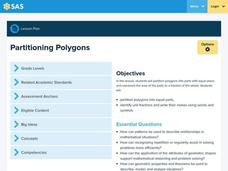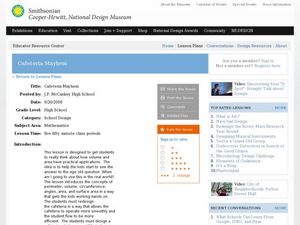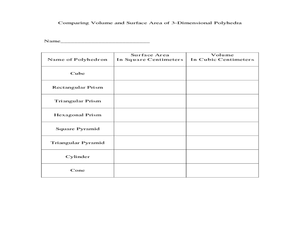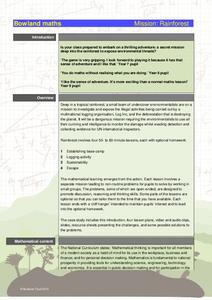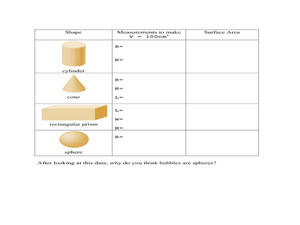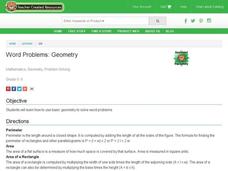Curated OER
Fraction Strips
Get a handle on equivalent fractions through the use of manipulatives. Using area models, sets, and length manipulatives like fraction strips and Cuisenaire rods, the class will gain a deeper understanding of equivalent fractions....
Curated OER
Traditional American Indian Lodges
Students explore the mathematical properties of traditional American Indian lodges. They examine the effect of increasing sides of a polygon, calculate the surface area of prisms and cylinders, and construct a classroom size pyramid...
Curated OER
New Boxes From Old
Middle schoolers find the volume and surface area of a rectangular box (e.g., a cereal box), and then figure out how to convert that box into a new, cubical box having the same volume as the original. As they construct the new,...
Curated OER
Baseball Geometry
Students apply various methods for finding the volume and surface area of sphere. They compare and contrast results among these mathematical methods. They work in cooperative groups to discuss their results with one another.
Creative Educator
Dream Room Design
Using the Twist™ application, elementary schoolers design their dream room. They follow the prescribed steps to calculate width, length, perimeter, and surface area in order to create a 2-dimensional representation of their dream room...
Curated OER
The Amazing Inch and Measuring Up!
Fifth graders study the metric and customary systems of measuring length with rulers, meter / yardsticks, and tape measures. They determine area of polygons and surface area and volume of three-dimensional shapes. They list as many...
Curated OER
Polydron Fun
Students investigate nets as they relate to volume and area. In this geometry lesson plan, students use nets as a visual to deepen their understanding of surface area and volume of objects. They make conjectures about different objects...
Curated OER
How do living and non-living structures affect coral reef habitats?
Students create model coral reefs showing surface area and including examples of communities. In this coral reef lesson, students research and explore the functions or benefits from a coral reef. Students design a benthic...
Curated OER
Tricky Traps
Students create identify properties of trapezoids. In this geometry lesson, students calculate the area of given trapezoids and review the area formula for parallelograms. They draw a correlation between the area of a trapezoid and that...
Curated OER
Cafeteria Mayhem
Students design a cafeteria floor plan. For this area and perimeter lesson, groups create an efficient lunchroom layout on poster board by using geometric shapes and formulas as the basis for their designs. In the accompanying writing...
Curated OER
Animal Tracks
Students are introduced to the topic of area. In groups, they share various techniques to help them identify different shapes and work together to calculate the area. They use this same knowledge to determine the area of animal tracks...
Curated OER
Copy Cat
Students examine a Webmath page, and demonstrate how to copy and paste. They create a computer-generated template page presenting the attributes of two- and three- dimensional shapes.
Curated OER
The Value of Volume
Students measure the perimeter and area of their polygons. In this geometry lesson plan, students calculate the volume and area using the correct tools. They calculate the time and temperature and the perimeter and side lengths of...
Curated OER
Sun, Shadows, Surface Structure...and the Face on Mars
Students use light and shadow information to make inferences regarding the three dimensional shapes of specific objects photographed on the surface of Mars. Limitations of the of the data provided are discussed and entries made into the...
Curated OER
Probing Under the Surface
Eighth graders use a measuring stick to determine the shape of the inside of the bottom of a box, then apply their knowledge to an additional situation. This task assesses students' abilities to make simple observations, collect and...
Bowland
Mission: Rainforest
Young environmentally conscious mathematicians solve a variety of problems related to the central theme of uncovering illegal logging activities. They determine a base camp based on given constraints, investigate logging activities and...
Curated OER
How Mountains Shape Climate
Students use raw data to make a climatograph; they explain the process of orographic precipitation and the concept of a rain shadow.
Alabama Learning Exchange
Pennies, Pennies and More Pennies
Learners determine the number of pennies needed to fill a room. For this pennies lesson plan, students work in groups to determine the number of pennies needed to fill a room. They compute the probability of the head of a pin...
Curated OER
Candy Land
In this activity students pretend that they have been hired by a candy manufacturer to design a box for a new product they are beginning to market. The manufacturer has pre-determined the volume of the candy box. It is the students' job...
Curated OER
Why are Bubbles Spheres
Students calculate the surface area of different polygons. In this geometry lesson, students practice calculating the volume of spheres. They work with cones, cylinders and rectangular prisms.
Curated OER
A Sphere and Its Net
Learners identify and sketch the nets for sphere. For this geometry lesson, students differentiate between two and three dimensional shapes. They find the surface area of each sphere.
Curated OER
Sketching Cylinders
Students create nets of cylinders. In this geometry lesson, students calculate the surface area of cylinders and other solids. They show their understanding of three-dimensional shapes by solving problems.
Curated OER
Measuring with Mathematics
Eighth graders discover how the change in the dimensions of a shape cause a change in the overall area of the shape, but the perimeter stay the same. They, in groups, go out to the playground and construct large areas using stakes and rope.
Curated OER
Word Problems: Geometry
Students solve word problems by using basic geometry. In this geometry lesson, students use geometric formulas to find the perimeter, area, and volume of objects. Students complete a worksheet.
